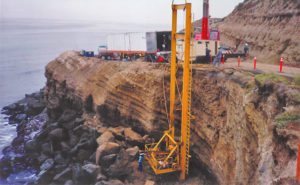
Employment of geological engineers is projected to grow 8 percent from 2018 to 2028, about as fast as the average for all occupations. Employment growth for geological engineers will be driven by demand by state and local governments’ concerns regarding water availability and quality should lead to efforts to increase the efficiency of water use. In addition, as companies look for ways to cut costs, they are expected to contract more services with engineering services firms, rather than employ engineers directly.

CalGeo Members Include
Affiliate Members Include

CalGeo is the voice of geotechnical engineering consultants throughout the Golden State and is the ONLY professional organization exclusively committed to unifying, strengthening and advancing California’s geotechnical consulting industry.

Geotechnical engineers need a bachelor’s degree in civil engineering, in one of its specialties, or in civil engineering technology. They typically need a graduate degree and licensure for promotion to senior positions. Although licensure requirements vary by state, geotechnical engineers usually must be licensed if they provide services directly to the public.